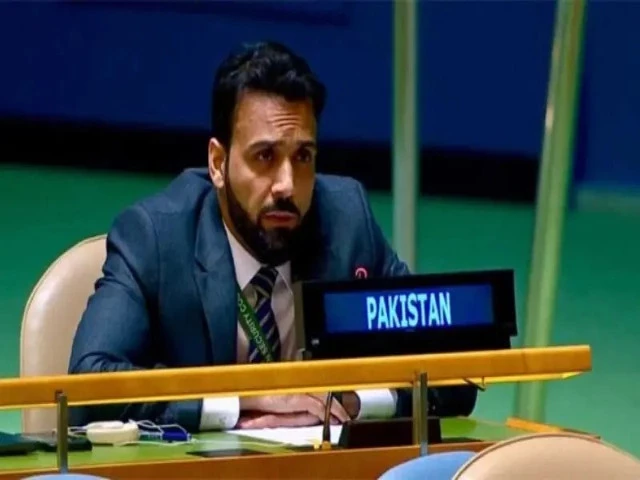Pakistan hits back at India's UN jibe
Diplomat terms 'Terroristan' slur petty, shameful

Pakistan took strong exception when India called it "Terroristan" at the United Nations on Saturday, saying the attempt to distort the country's name was "utterly shameful" and petty.
"It is utterly shameful that India stoops so low as to distort the very name of a country, a member of the United Nations," Pakistani diplomat Muhammad Rashid told the UN General Assembly, which saw a fiery clash between the two South Asian neighbours — the second in the current session.
Rashid, a second secretary at the Pakistani Mission to the UN, was exercising his right of reply to his Indian counterpart, Rentala Srinivas, who accused Pakistan of promoting terrorism, saying, "No arguments or untruths can ever whitewash the crimes of Terroristan."
Hitting back, the Pakistani diplomat said: "Resorting to mockery of a sovereign nation-state's name is not just undignified, it is also a deliberate attempt to malign and insult an entire people. This is not a local political congregation," Rashid told the 193-member Assembly.
"By engaging in this kind of rhetoric, India diminishes its own credibility, showing the world it has no substantive argument to offer — only, I am sorry to say, cheap slurs which are not worthy of serious discourse."
He added: "Such language reflects neither maturity nor responsibility. Instead, it exposes that India is frustrated and reveals its pettiness on the world stage."
Rashid said India itself has been implicated in supporting and sponsoring terrorism beyond its borders, citing reports pointing to networks run by Indian intelligence agencies to destabilise neighbouring countries.
"Intelligence operatives have been accused of financing and directing groups engaged in sabotage and targeted killings across the world," he said.
"Undermining regional stability and violating international law is a habit for India," he continued, adding that such actions expose the "duplicity of its counterterrorism claims" and raise concerns about its role in fuelling, rather than combating, terrorism.
Rashid's sharp retort evoked no further response from Srinivas, a second secretary at the Indian Mission, and with that the presiding officer closed the fifth day of the General Debate.
Earlier, Rashid had taken issue with Indian External Affairs Minister S Jaishankar, who accused Pakistan of sponsoring terrorism and branded it the "epicentre of global terrorism."
Rashid called the remarks "devoid of facts" and accused India of being "a serial perpetrator of terrorism" and "a regional bully." He said Pakistan had sacrificed over 90,000 lives in the fight against terrorism, sacrifices "recognised globally."
Referring to Indian actions in Indian Illegally Occupied Jammu and Kashmir (IIOJK), he listed "extrajudicial killings, arbitrary arrests, detentions, staged encounters and collective punishment under the cover of counterterrorism" as examples of state terrorism.
He also cited the case of Commander Kulbhushan Jadav, an Indian naval officer captured by Pakistan, as proof of "a sinister cross-border terrorist web." On the Pahalgam incident, Rashid dismissed Jaishankar's claims as "bizarre and untenable," saying India rejected Pakistan's offer of an independent investigation.
Instead, he said, India used it as a pretext for "blatant aggression" from 7-10 May, which killed 54 civilians, including 15 children and 13 women. Pakistan, he insisted, responded "befittingly yet carefully," targeting only military assets and downing multiple aircraft.
Reaffirming Pakistan's commitment to peace, he concluded: "More than 1.9 billion people of South Asia, a quarter of the world's population, deserve prosperity and stability. But these goals cannot be achieved through threats and intimidation. True progress requires sincerity, mutual respect, dialogue and diplomacy — principles Pakistan has upheld, and which India must finally choose to embrace, if it truly seeks peace."



















COMMENTS
Comments are moderated and generally will be posted if they are on-topic and not abusive.
For more information, please see our Comments FAQ